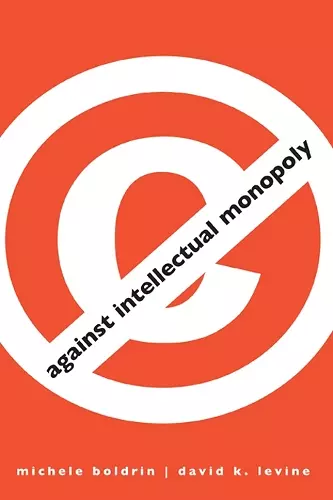Against Intellectual Monopoly
Michele Boldrin author David K Levine author
Format:Paperback
Publisher:Cambridge University Press
Published:25th Jan '10
Currently unavailable, and unfortunately no date known when it will be back

This book argues that patents and copyrights are not necessary for innovation and overall do not serve the public good.
This book examines patents and copyrights. It argues that these are not necessary for innovation and are detrimental to the common good, rather than beneficial. Unlike competing titles, the book has broad coverage of both copyrights and patents and is designed for a general audience, focusing on simple examples.'Intellectual property' - patents and copyrights - have become controversial. We witness teenagers being sued for 'pirating' music - and we observe AIDS patients in Africa dying due to lack of ability to pay for drugs that are high priced to satisfy patent holders. Are patents and copyrights essential to thriving creation and innovation - do we need them so that we all may enjoy fine music and good health? Across time and space the resounding answer is: No. So-called intellectual property is in fact an 'intellectual monopoly' that hinders rather than helps the competitive free market regime that has delivered wealth and innovation to our doorsteps. This book has broad coverage of both copyrights and patents and is designed for a general audience, focusing on simple examples. The authors conclude that the only sensible policy to follow is to eliminate the patents and copyright systems as they currently exist.
'One should bear a heavy burden of proof to enjoy a monopoly. Boldrin and Levine have dramatically increased that burden for those who enjoy intellectual monopoly. All economists, lawyers, judges, and policymakers should read this book.' W. A. Brock, University of Wisconsin, Madison
'Boldrin and Levine, highly respected economic theorists, have produced a lively and readable book for the intelligent layman. In it, they challenge conventional wisdom about patents and argue that we would be better off without them. The book will open a fresh debate on the policy on intellectual property protection.' Boyan Jovanovic, New York University
'There is a growing and important skepticism about the fundamental rules we have used to regulate access to information and innovation. This beautifully written and compelling argument takes the lead in that skeptical charge.' Lawrence Lessig, Stanford Law School
'For centuries, intellectual property rights have been viewed as essential to innovation. Now Boldrin and Levine, two top-flight economists, propose that the entire IPR system be scrapped. Their arguments will generate controversy but deserve serious examination.' Eric Maskin, Institute for Advanced Study, Princeton
'This is an important and needed book. The case made by Boldrin and Levine against giving excessive monopoly rights to intellectual property is a convincing one. Monopoly in intellectual property impedes the development of useful knowledge. I think they make the case that granting these monopoly rights slows innovation.' Edward C. Prescott, University of Minnesota
'Boldrin and Levine present a powerful argument that intellectual property rights as they have evolved are detrimental to efficient economic organization.' Douglass C. North, Washington University in St Louis
'How have we come to view ideas as if they have some physical existence that we can lock up behind a set of property rights laws akin to, but remarkably different from, those we use to protect our physical property? This is the central question in Against Intellectual Monopoly by Michele Boldrin and David Levine. The answer they come to is startling: except in a few rare cases, intellectual property protection does more economic harm than good and ought to be eliminated. The technology of digital computers and the Internet, as Boldrin and Levine show again and again, has exposed long-standing moral shortcomings of current intellectual property laws in a particularly stark way.' Stephen Spear, Carnegie Mellon University
'This thought-provoking book should be read not only by academics interested in intellectual property, innovation, growth and the dynamics of markets, but also by policymakers and the general public.' Martin Peitz, University of Mannheim
ISBN: 9780521127264
Dimensions: 230mm x 153mm x 16mm
Weight: 420g
306 pages